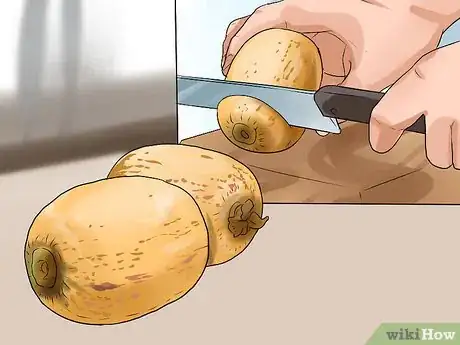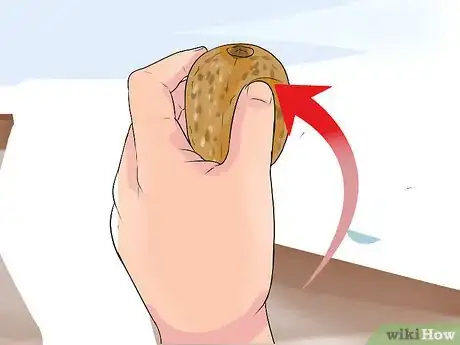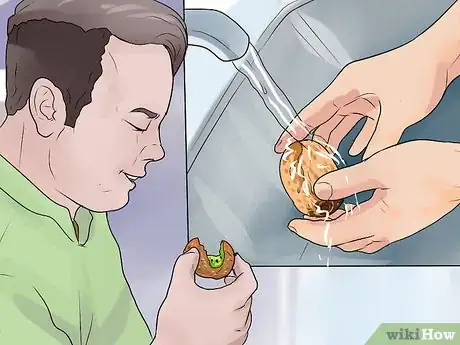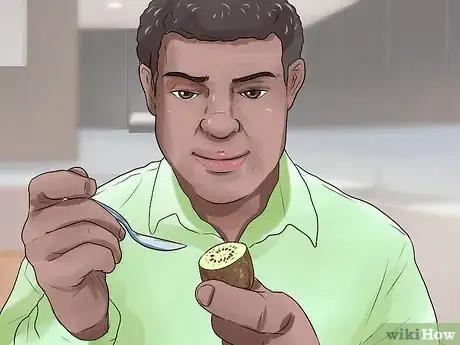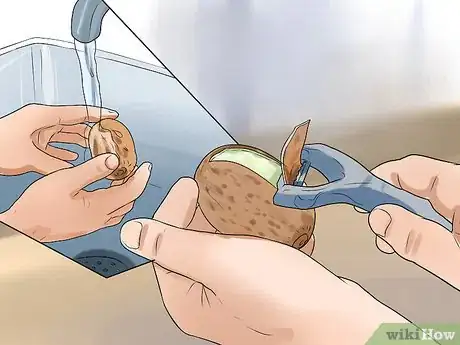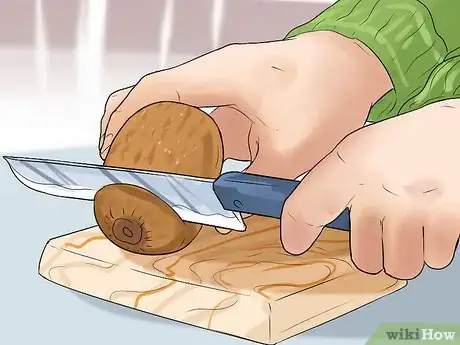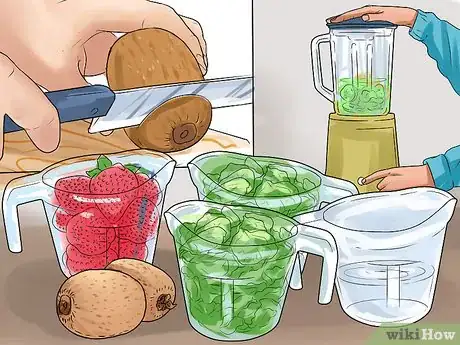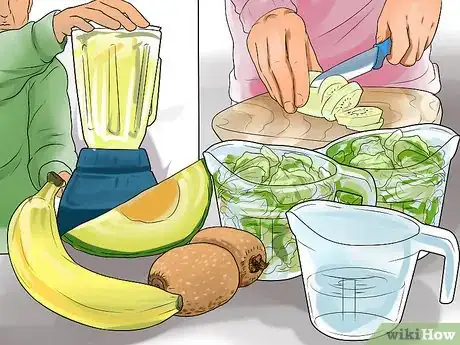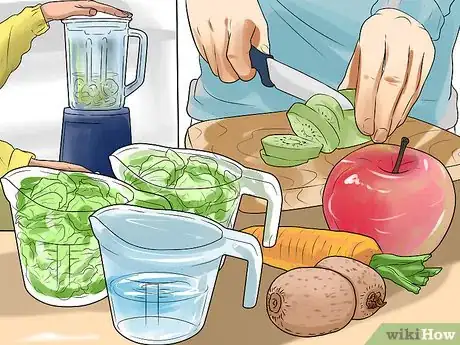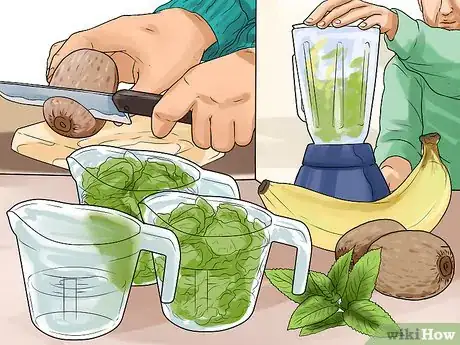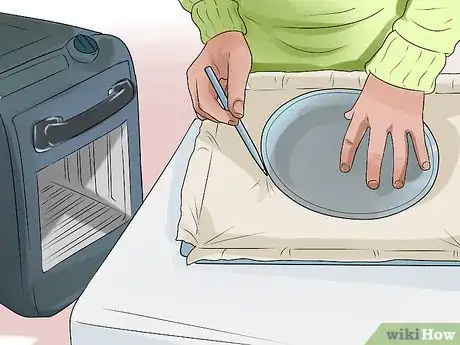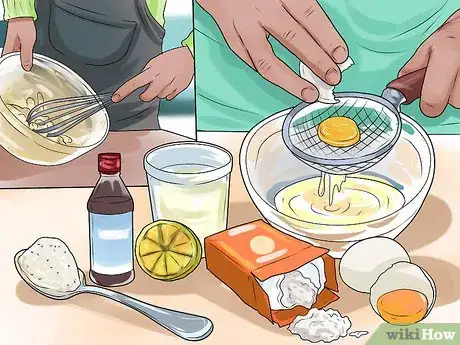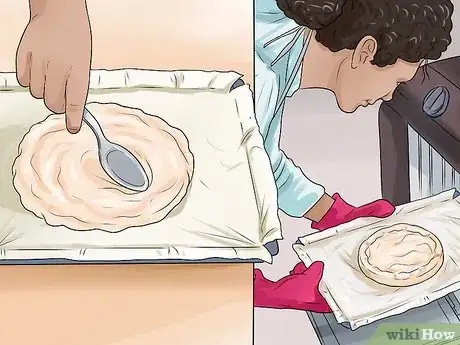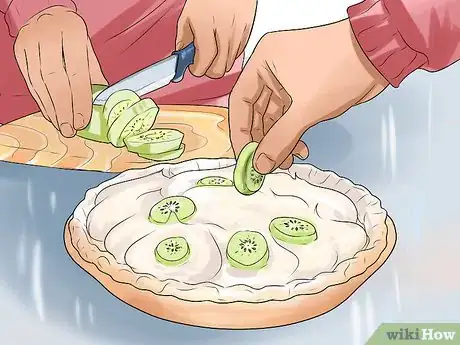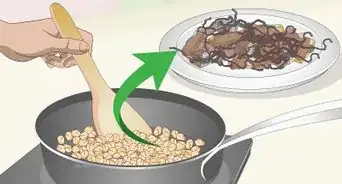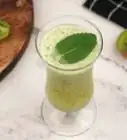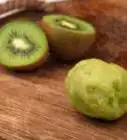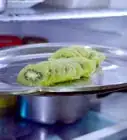This article was co-authored by wikiHow Staff. Our trained team of editors and researchers validate articles for accuracy and comprehensiveness. wikiHow's Content Management Team carefully monitors the work from our editorial staff to ensure that each article is backed by trusted research and meets our high quality standards.
wikiHow marks an article as reader-approved once it receives enough positive feedback. This article received 13 testimonials and 89% of readers who voted found it helpful, earning it our reader-approved status.
This article has been viewed 665,651 times.
Learn more...
Originating from China, kiwis are now more widely grown in places like New Zealand and California. Loaded with vitamins and minerals, they’re a very tasty and healthy snack that can be enjoyed on their own or as the base for your smoothies. If you’re feeling a little decadent, you can also whip up a pavlova, which is a traditional meringue dessert from
Ingredients
- 2 kiwis
- 2 cups leafy greens (60 g)
- ½ cup water (118 ml)
- other fruit or vegetables (such as banana, avocado, apple, and carrot)
- 4 leaves mint
(makes one serving)
- 4 egg whites
- 1.25 cups white sugar (250 g)
- 1 teaspoon vanilla extract
- 1 teaspoon lemon juice
- 2 teaspoons cornstarch
- 1 pint heavy cream
- 6 kiwis
(makes eight servings)
Steps
Munching on Plain Kiwi
-
1Trim the ends. Before you dig in, check the outside of your kiwi. Note that most of the skin’s surface is a fuzzy brown, with a raised bumpy pit at the top, which is where it grew from its vine. This is the only inedible part of the kiwi, so either trim it off or eat it around it.[1]
-
2Test for ripeness. To test kiwi, gently press it in your hands. If the flesh yields under the skin, it’s ready to eat. If it still feels hard, let it sit at room temperature until it softens. Expect underripe kiwi to taste too tart to really be enjoyed.[2]Advertisement
-
3Eat it skin and all. Take the easiest approach and take sink your teeth right into it, as you would with an apple or peach. Enjoy the contrast in textures between the tougher skin and the soft flesh within. Reap the kiwi’s full nutritional value, since the skin contains a large part of its fiber, mineral, and vitamin content, as well as antioxidants and flavonoids. However:[3]
- As with all produce, be aware that the outside may have traces of pesticides used in farming. Wash it under cold water while gently scrubbing the skin with your fingertips to remove trace chemicals.[4]
- Organic kiwi reduces the risk of ingesting pesticides, but should still be washed in order to remove any dirt or other chemicals that it may have come into contact with by chance.
-
4Spoon it out. If you don’t like fruit skins, simply chop the kiwi in half. Treat each half as a readymade bowl and spoon yourself out some bite-size chunks. Alternatively:[5]
- Slice off both ends, where the kiwi was attached to its vine, and hold the kiwi in one hand.[6]
- With your other hand, insert the tip of your spoon between the flesh and skin along your cut.
- Press the spoon deeper into the flesh and twist the kiwi around in your hand.
- Remove the flesh and cut it into slices.
-
5Use a vegetable peeler. Peel the skin off as you would with a potato. Once you’re done, eat the flesh as it is or slice it up into bite-size bits. However, keep in mind that:
- You should still wash the skin before peeling. Even though you won’t be eating it, your vegetable peeler may transfer dirt and chemicals from the skin to the flesh as you go along.
Trying Different Kiwi Smoothies
-
1Remember to trim off the ends. Whether you decide to peel your kiwis for your smoothies is up to you. Either way, don’t forget to trim off the ends where they were plucked from their vines. Remember that this part is inedible, so discard before using.[7]
-
2Pair kiwis with strawberries. Chop up two kiwis and place them in a blender. Add one cup (152 g) of strawberries and two cups (60 g) of a leafy green, like spinach. Pour in a half cup (118 ml) of water and blend until smooth.[8]
-
3Try kiwis with banana and avocado. Chop up two kiwis and one banana and throw them in your blender. Slice off a quarter of an avocado and add that to the other fruit. Add two cups (60 g) of leafy greens and a half cup (118 ml) of water, then blend until smooth.[9]
-
4Go with an apple-carrot combo. Chop up two kiwis as well as one whole apple and one whole carrot. Throw them in the blender along with two cups (60 g) of leafy greens. Pour in a half cup (118 ml) of water. Blend until smooth.[10]
-
5Make it minty. Chop up two kiwis and one banana and transfer to your blender. Add two cups (60 g) of leafy greens, plus four mint leaves. Blend with a half cup (118 ml) of water until smooth.
Topping a Pavlova with Kiwi
-
1Prep your oven and baking sheet. First, set your oven to 300 degrees Fahrenheit (150 degrees Celsius). While that preheats, line your baking sheet with parchment paper. On the paper, trace a circle roughly nine inches (23 cm) in diameter.[11]
-
2Make your meringue. Crack your eggs and remove the yolks. Add the whites to a large mixing bowl and beat them. Add one tablespoon of sugar and mix it in as you continue to beat your egg whites, then repeat until you’ve added all your sugar. Once the mixture turns thick and glossy, fold in your vanilla extract, lemon juice, and cornstarch.[12]
-
3Fill the circle, then bake. Use a spoon to transfer the meringue to the circle that you traced on your parchment paper. To start, keep the bulk of it toward the center. Once all the meringue has been transferred, use your spoon to spread the meringue from the center out toward the edges. Continue to do so until the edges are higher than the center. Place the baking sheet in the oven and bake for one hour.[13]
-
4Top your meringue. Once the meringue has finished baking, transfer it to a wire rack to cool off. While it does, beat your heavy cream in a small mixing bowl until it turns into stiff little peaks on the surface. Peel and slice your kiwi as evenly as possible. Once the meringue has cooled, transfer it to a serving plate, fill the center with your whipped cream, arrange your kiwi slices on top, and serve.[14]
Community Q&A
-
QuestionIs it okay to freeze or refrigerate them?
 Community AnswerOf course! Doing so will prolong the life of fruits and vegetables.
Community AnswerOf course! Doing so will prolong the life of fruits and vegetables. -
QuestionAre kiwi seeds bad for you?
 Community AnswerNo! They are in fact very good for you! They provide a number of essential nutrients including Omega-3, fiber, and Vitamin E. Be warned - you may get an allergic reaction if you are allergic to peanuts and/or tree nuts.
Community AnswerNo! They are in fact very good for you! They provide a number of essential nutrients including Omega-3, fiber, and Vitamin E. Be warned - you may get an allergic reaction if you are allergic to peanuts and/or tree nuts. -
QuestionCan I eat the seeds of a kiwifruit?
 Community AnswerYes, you can. Kiwifruit seeds are packed with great nutrients for your body. Just be aware that kiwifruit seeds may cause an allergic reactions if you have a nut allergy.
Community AnswerYes, you can. Kiwifruit seeds are packed with great nutrients for your body. Just be aware that kiwifruit seeds may cause an allergic reactions if you have a nut allergy.
Things You’ll Need
Plain Kiwi
- Spoon (optional)
- Knife (optional)
- Peeler (optional)
Smoothies
- Measuring cups
- Cutting board
- Knife
- Blender
Pavlova
- Oven
- Baking sheet
- Parchment paper
- Food-safe pen
- Mixing bowls
- Measuring cups and spoons
- Beater
- Large spoon
- Wire rack
- Cutting board
- Knife
References
- ↑ https://www.theawl.com/2014/09/eat-the-skin/
- ↑ http://food.ndtv.com/facts/how-to-eat-kiwi-fruit-5-genius-ways-1416690
- ↑ https://www.theawl.com/2014/09/eat-the-skin/
- ↑ http://food.ndtv.com/facts/how-to-eat-kiwi-fruit-5-genius-ways-1416690
- ↑ https://www.theawl.com/2014/09/eat-the-skin/
- ↑ http://food.ndtv.com/facts/how-to-eat-kiwi-fruit-5-genius-ways-1416690
- ↑ https://www.theawl.com/2014/09/eat-the-skin/
- ↑ http://www.incrediblesmoothies.com/recipes/kiwi-smoothie-recipes-and-nutrition/
- ↑ http://www.incrediblesmoothies.com/recipes/kiwi-smoothie-recipes-and-nutrition/
About This Article
To eat a kiwi, start by cutting the stem end off with a knife. Then, bite into the kiwi and eat it like you would an apple or a peach. If you don't like the skin, use a spoon to scoop the fruit out from inside of the kiwi. You can also use a vegetable peeler to peel off the skin so you're left with just the fruit. If you want to learn how to incorporate your kiwi in smoothies, keep reading the article!
